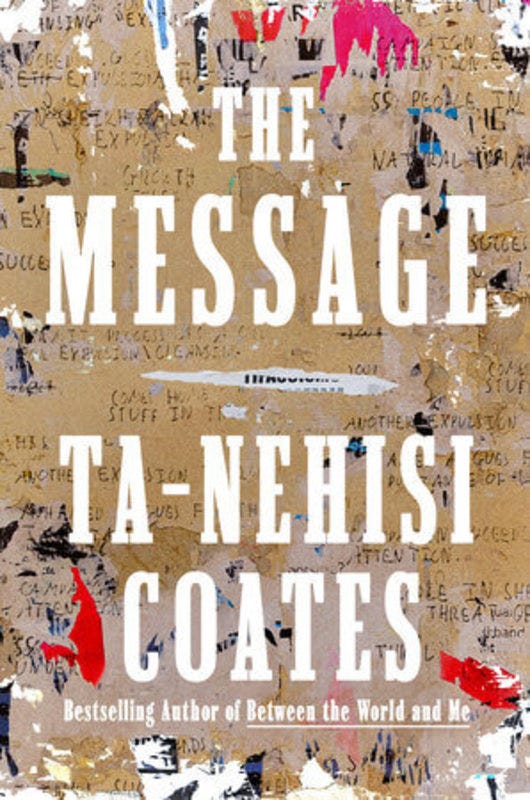Ta-Nehisi Coates
The opinions expressed here are solely the author's and do not reflect the opinions or beliefs of the LA Progressive.
“The quality of light by which we scrutinize our lives has direct bearing upon the product which we live, and upon the changes which we hope to bring about through those lives. It is within this light that we form those ideas by which we pursue our magic and make it realized.” Audre Lorde
Since its publishing date of less than a month ago, Ta-Nehisi Coates’ book of reflections on his recent travels to South Carolina, Senegal, and Palestine has garnered enormous global attention. He has been pilloried by numerous news outlets (NY Times, CBS News, The Atlantic, The New Yorker, etc.) for “leaving out essential” aspects of the Israel/Palestine conflict. And he has been feted in other media circles by the likes of John Stewart, Trevor Noah, and Chris Hayes for his stance on the apartheid conditions that he witnessed in the West Bank.
In a few short weeks, ‘The Message’ has become the most talked about book in the country precisely because of Coates’ linkage of the oppression that he witnessed in Palestine to that of the institution of slavery in the U.S.
Currently, Coates is touring the nation to promote this book and last night he was hosted by ‘Live Talks Los Angeles’ at Culver City High School’s Robert Frost Theater. Nearly 1,200 Angelenos turned out to hear Coates’ conversation with writer/talk show host Sam Fragoso.
Related: Palestinian-Led Demonstration Was Rightful Protest, Not Antisemitism
In a wide-ranging discussion that covered many of the topics that other interviews have investigated, the issue of the pending Presidential election surfaced. When asked by Fragoso about his thoughts about who to vote for on November 5, Coates shared his recent experience at a book talk in Oakland, which was the first majority Muslim event of the book tour. He met a man who was born in Gaza there and who tearfully told Coates that one-sixth of his family had been wiped out in the past year by the Israeli military. “How do you tell a man from Gaza, who has lost one-sixth of his family, to vote for Kamala Harris,” lamented Coates.
The challenge of a false choice in elections is nothing new in U.S. political history. According to Coates, during the Civil War, President Abraham Lincoln stated that if he could stop the Civil War without ending slavery, he would. And his opponent, General George McClellan was opposed to the Emancipation Proclamation and planned to reinstate slavery if elected President. From Coates’ perspective, the options in today’s Presidential election are similarly bleak. And noted that it “certainly could get worse” under a Trump administration. Nevertheless, with President Biden fully supporting Israeli President Netanyahu’s military destruction of Northern Gaza and Kamala Harris’ alignment with that policy, voters who are concerned about Palestinian lives have a similar dilemma to those in 1864.
Coates expanded on the cognitive dissonance of the Democratic Party with regards to its complete avoidance of a ceasefire and Palestinian rights at the Democratic National Convention. From a historical perspective, this was the most progressive and inclusive DNC ever, with homages to Fanny Lou Hamer, Shirley Chisholm, and Jesse Jackson, who were recognized for their seminal civil rights work. And yet when the Arab American community requested that a Palestinian American speak at the DNC for a mere two minutes, they were denied by the party’s leadership.
Related: Those Who Love Peace: A Story of Nonviolent Activism
How can it be, observed Coates, if we are the sworn enemies of apartheid in any form, that the Democratic Party still supports Israel’s actions in Gaza and the West Bank. What options then are there for voters, especially those in the Arab-American community, when they feel unseen and unheard by both parties.
It is likely that the criticism of Coates and how he chose to write his book ‘The Message’ will continue in the coming weeks and months, especially as Israel moves forward with its military objectives. One of the main reasons is because Coates has revealed a truth that many benefit from obscuring and denying. He has laid bare the hypocrisy of empire and how it uses institutions like universities, political parties, newspapers, television hosts, etc. to maintain power and the status quo.
And herein lies the promise of ‘The Message’, that “The systems that we oppose are systems of oppression, and thus inherently systems of cowardice. They work best in the dark, their essence tucked away and as unexamined as the great American pastime was once to me.” Coates shined a light on the injustice of apartheid and because of that beacon, we can never look away.




